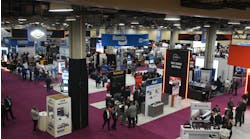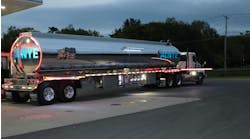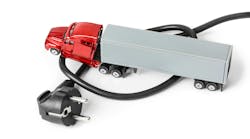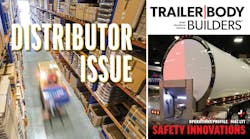NEW CARLISLE, Indiana—Vocational trucks need to be as versatile as they are tough. And though productivity is still paramount on gravelly jobsites and slushy roads, modern vocational fleets also require more uptime and efficiency out of their hardest-working assets. And, of course, ease of upfit is crucial. All of these factors were top of mind for International Motors when the OEM formerly known as Navistar went to work redesigning the HV Series for Model Year 2025.
“We took the workhorse of the International product line, modernized its appearance, and powered it with the industry’s most advanced powertrain,” said Andy Hanson, International vocational marketing director. “We also raised the bar when it comes to chassis and body integration by helping customers increase productivity and reduce equipment downtime.”
These include new engine options, driver comfort and safety enhancements, upgrades to the Diamond Logic electrical system, commonized components across models for easier upfitting and more.
This is also International’s first redesign process that leverages the OEM’s three advisory councils, comprising experts in utilities, public, and construction sectors, respectively. The HV has roots reaching back to 2001 and the 7000 Series launch, and that solid DNA was not disrupted with all the changes, according to Hanson.
“Internally, we referred to [the HV Series] as the Swiss Army knife of the industry; we didn’t want to disturb that that foundation,” he assured.
The new Class 6 & 7 HV starts production next summer, with models including the HV509 and HV 609 on the lighter side and HV515 and 615 on the HD side. Gross vehicle weights range from 51,000 to 73,000 lbs. Along with several other industry press members, we were invited in mid-September to the Navistar Proving Grounds (now officially the International Proving Grounds) to take a look at the brand-new HV series.
Powertrain
For the bigger models, the biggest change will be the S13 Integrated Powertrain under the hood.
The LT Series (OTR) and HX Series (severe duty) are already available with the new powertrain platform, which has improved engine efficiency and reduced emissions via a dual-stage aftertreatment system. Maintenance and complexity were also reduced, as the S13 engineers eliminated the exhaust gas recirculation (EGR) cooler and diesel oxidation catalyst.
Two new crawler gears were also added to the T14 transmission. The 509 and 609 will be available with a Cummins L9 engine and Eaton or Allison transmissions.
“The S13 Integrated Powertrain packaged with the redesigned HV delivers our best solutions for operational performance, fleet management, body integration and driver experience,” said Chad Conley, vice president, Work Truck. “And with the backing of our service contracts, customers will see we’ve simplified the ownership experience, so they can focus on the areas of their business that matter most.”
Read more: Navistar rebrands as International Motors
The new HV will also have expanded PTO options.
“With our integrated powertrain, we’re now able to offer PTOs installed at the plant,” Hanson continued. “And we’re also increasing the amount of lift axles that we offer at the plant—tag or pusher.”
Cab and chassis
The cab is made of double-sided galvanized steel for more durability, and anti-corrosion coating will ensure the elements and road salt won’t prematurely degrade the exterior. The rails can endure 2,000 hours of exposure before corrosion sets in, and the exterior about 1,000 hours, Hanson said.
Chad Semler, director of product management (my co-pilot when I drove an HV509 on the off-road track) noted for plows, there’s an option for a heated windshield, and that the hood mirror is sturdy enough for mounted lights.
Configurations include day cab, extended cab and crew cab, which will look a little different, too. Noticeable changes include a sloped hood and panoramic wide windshields that increase visibility 48 to 53” depending on the model.
Depending on the model, the hood will be four or five pieces and made of sheet molded compound, making it easier to repair with a fiberglass patch, Hanson said. It’s also now 30% easier to open than the previous version.
And when the hood is opened 30 degrees, a 2-amp light illuminates everything under the hood to make early-morning pre-trip checks for leaks and cracked hoses a little easier. Drivers can also check oil and coolant levels on the dash by toggling through the various fluid categories.
“You’ll either get a red X [if fluid is needed] or a green check if it is within tolerance,” Hanson noted.
Getting into the cab was made easier with a flexible third step.
Customers will also be able to spec LED headlights, which offer 30% better visibility versus the standard halogen bulbs. Both feature a heating element that turns on based on ambient temperature. Oncoming traffic will also appreciate a sensor that detects other headlights and automatically switches from high to low beams.
Upfitting
Because these work trucks are meant for very specific applications, one cannot simply walk into a rental office to get the equipment they need for the jobsite, Hanson said.
“This vehicle is an integral part of their job,” the International vocational marketing director continued. “One of the hallmarks of the HV—and International overall—is integrating our product with the body and into the customer’s business.”
International already works with and supports body builders and truck equipment manufacturers via its Diamond Partner Program, and the HV makes upfitting even easier now with a few tweaks to reduce complexity.
Complexity, after all, adds to costs and increases the risk of a lower-quality final product. Across the models and configurations of the HV Series, upfitters will notice some component locations are in the same place, including the fuel water separator and air dryer.
Maintenance
Additionally, there are multiple options fleets can choose for service. These include the preventive maintenace package, the powertrain package, and the powertrain + chassis package.
International also has a cadre of “uptime advocates” at the ready who can monitor a vehicle’s telematics gateway to get ahead of maintenance issues.
“When it’s time for either a PM—or we see something that gets down the vehicle—we call that fleet manager and we proactively say, ‘Hey, it’s time, you [have to come in for service] in a week, or two weeks or so,’ or ‘Hey, we see something,’” Hanson explained.
New to the HV Series is proactive service planning, where one of the company’s 600 dealers in North America schedules service appointments around a customer’s commitments, which provides greater flexibility and adaptability.
They can also provide more accurate windows for customers, so the driver can drop off the truck, get the needed service in a few hours, and get back out on the road, versus having to leave the shop and then come back.
The HV Series also comes with various warranty options, some of which include:
- 3 year/100,000 miles (6 events)
- 4 years/150,000 miles (8 events)
- 5 year/200,000 miles (10 events)
Another mileage-based options is:
- 5 years/350,000 miles (8 events)
For a full list of each model’s specifications, visit International’s HV Series product page.










